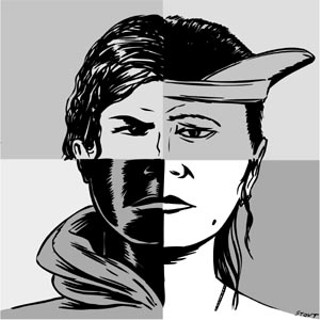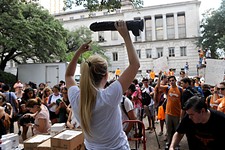Letters at 3AM
'It's not my country'
By Michael Ventura, Fri., July 9, 2004

It is no news to anyone that the fundamental nature of this country is changing in more ways, and on more levels, than anyone can document – economically, environmentally, politically, racially, technologically, educationally, culturally, religiously, and on and on and on, with every change influencing every other so swiftly and so thoroughly that every decade the word "America" seems to describe a very different country than it described the decade before. Is a new America being birthed, or is America's very fabric being torn apart? No one knows. No political party and leader have demonstrated the imagination to comprehend this time, much less to forge policies adequate to the changes. What good is all our power if we've lost the power to understand? Without understanding, all we can make are mistakes. What James Baldwin wrote of the America of 1961 is even more true of the America of 2004: "It cannot be too often repeated in this country now, that, where there is no vision, the people perish."
To have a vision one must see. I'm writing this because recently I saw, through another's eyes, two crucial aspects of all our changes: immigration and education. One of America's most underreported changes is how our big cities, especially on the coasts, now are populated by more kinds of people, from more places in the world, than anywhere in history. What does that feel like on the streets? These are words of Mihal Freitas, a 10th-grade student in the San Fernando Valley. I'm excerpting her at length, from a longer piece, because I've seen no more poignant or detailed description of how many of us live. She writes (quoted with her permission):
"It is 7:30am. Kids from every direction are walking to Grant High School. Stopping to congregate with their people in their language. The Mexicans walk down from Victory Boulevard and their area. Their baggy jeans as if inflated by a catch of the wind; jerseys displaying their Raider pride with the universal gang number 13. Girls dressed similarly, tight pants, hair slicked back, tongues clicking with the latest gossip, 'Si, si, ya, I heard that bitch got pregnant.' The Armenians take a car show in the front of the school, their area. The boys carry folders under their arms, one side displaying the Armenian flag, the other fancy cars. The girls watch the boys in the fuzzy jump suits, the latest gossip, 'Ha, achchick Armen was talking to Siriun!' they sqawk in the latest fashion of Von Dutch jeans from Macy's. 'Da bleit da hadasha,' you hear as the Russians gather in their area. In simple warm-ups their morning cigarettes are lit as they discuss communism and the old country, the motherland of freedom. The girls smile in tight jeans with short hair lying around their rounded faces as they talk of their old boyfriends they had to leave in Moscow. The Jews/Israelis are dropped off with their hair carefully cut and gelled. Pants tight as they come, completely Euro-Tel Aviv style. ... In the middle of a conversation about nationalism you hear them recite which IDF [Israeli Defense Force] regiment they will be serving in. Stereotypical, you might say, majorities of the minorities are the majority and this is what is displayed.
"You would think the school a melding pot, as America has so strongly and optimistically defined itself as. But what happens when no one wants to meld? I will be stronger than you, I am better than you, materially I surpass you, your people are inferior, you are trash, and I will squash you with pride. This is our area, keep your fucking ass away.
"Lunch, the quad is an illustration of continents (even their interactions). Mexicans down in the cafeteria, Israelis/Jews in the middle, Armenians 'owning' the top of the quad, Russians claim the back. The wrong stare or look and the Armenians and Mexicans break into a war. Everyone else looks on unconnected as the riot police come barging in with batons, as trash cans fly.
"Drug wars are the only unity, everyone dies the same. Drugs don't differentiate – united by dealing, all get along. All divided by dealings gone wrong, someone dies. An overdose and it doesn't matter what you are when you die.
"Make change, start a revolution – why not? Because my generation only wants to talk. Act hard, but who will die for change? The resounding echo: 'This ain't my fucking country.' If not ours, the immigrants it was built by, then whose? Why then should I die for her? Here we live and it is 'easy'; you can make money, so we rape America for her goods. What do we really care? Watch her crumble in corruption? We live by our laws. 'This ain't my fucking country,' the echo repeats."
... So many clashing feelings when I read Mihal Freitas' words. Joy, that a 16-year-old could write so vividly and fiercely – with young writers like Mihal out there, there is still a great deal to look forward to in American literature. May she, and those like her, never learn any cutesy "postmodern" irony and "distance" in college; may she and her kind not lose their passion and their desire to see all sides and to fearlessly forge words. Also ... I felt a sense of familiarity: What she describes is not so different from the immigrant neighborhoods I grew up in a half century ago in New York City – Italians, Sicilians, Puerto Ricans, Irish, African-Americans, Jews, our rivalries and cliques and gangs. But there is one heartbreaking difference, and it makes all the difference in the world: Their new refrain, "This ain't my fucking country."
Why do they feel that? And why did we, very deeply, not feel that? In fact, we felt the opposite – and felt it so strongly! We simply and fundamentally assumed that we were Americans and that America would one day be ours. (The civil rights movement, for instance, could not have existed had African-Americans felt differently.) We were poor, marginalized, excluded, made fun of, and worse, much worse. Anglo America did all it could, in ways big and small, to let us know that they were the "real" Americans. But we didn't buy that. Partly because many of our elders had fought in World War II and Korea, and we males knew we'd all be subject to the draft, and to fight for America was to be American. Partly, too, because we all listened to AM radio, and by the mid-1950s everybody's music played on the same stations: Little Richard and Pat Boone and Perry Como and Patsy Cline and Elvis Presley and Johnny Cash and Rosemary Clooney and Frank Sinatra and Dinah Washington and Italian doo-wop and black doo-wop, singing one after the other, all day and all night, through the same speakers. But mostly I think it was this:
Public education educated. Our teachers may not have liked us, and they may not have treated us well, but they were determined that we learn. Getting "left back" was a great stigma among us, and it was real – you didn't get into the 8th grade if you didn't pass your 7th grade classes. It was as though America expected and demanded that we learn to read. America expected and demanded that we learn geography and history (a white-skewed, imperial history, but a history nonetheless). Even penmanship was important; hours in elementary school were spent learning to form letters legibly and gracefully. (The handwriting of my immigrant parents and relatives was elegant; they learned that in slum schools.) The Museum of Natural History and the Metropolitan Museum of Art were free – their culture was ours for a 30-cent round-trip subway ride, and many of us knew this and took advantage of it. The City College of New York was both free and excellent. All of that was there, for us, if we worked and studied for it. And it would make a difference: Our parents might be cab drivers or laundry pressers or file clerks or cops, but we could be other things, maybe better things. The promise was real. The education was real. And it made America real. It made America ours.
None of that is true any longer. So: "This ain't my fucking country." Imagine if the $55 billion we've pissed away on Iraq had been intelligently spent on educating our young? But it's not that kind of country anymore, and these kids know it. They're smart enough not to care for a country that doesn't care for them, and who can blame them? As Baldwin wrote, "Don't pledge allegiance to a flag that won't pledge allegiance to you." These kids can't feel like Americans unless and until we offer them a fair shot at being Americans. Is it really too late for that?
Thomas Jefferson: "Indeed I tremble for my country when I reflect that God is just." ![]()










